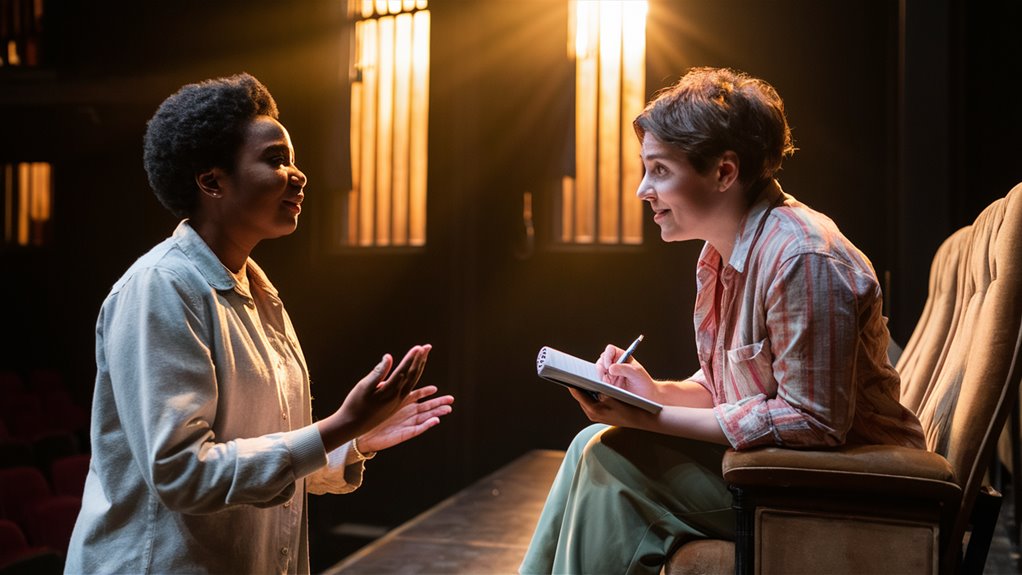Telling Friends About Their Shows Without Making Them Sad

Giving good feedback to friends who act or play music needs a mix of truth and kindness. Although some never say anything bad to avoid hurt, this may keep friends from getting better at their art. It’s about learning how to say things well a skill you get from helping performers improve and leading in the arts 호치민 KTV
Why Good Feedback Matters
When friends want to know what you think about their art shows, sharing your honest and helpful thoughts is key to their growth as artists. Whether it’s acting, playing music, or other art forms, knowing how to talk about their work helps them and keeps your friendship strong.
Parts of a Helpful Talk
- Look at small things, not just the overall act
- Note good things and areas to work on
- Discuss how they can do better
- Keep it professional, but stay friends
- Offer clear steps they can take to improve
Knowing these tactics makes talking about art helpful and keeps friendships and the artist’s growth going strong. Taking a gentle and clear approach helps you help your friend on their artist’s path while keeping your friendship close confident performers through
First, Say Something Nice
The Way to Talk About Performances: Start with Good Words
How to Share Good Performance Thoughts
Real compliments start off any helpful performance chat.
When you look at a performer’s work, start with the good parts that stood out.
Focus on real moments when their stage force or deep feeling in music shone.
Detailed Comments and Real Recognition
Feedback is stronger with precise comments.
Noting things like “great time for making us laugh” or “super clear speech in key parts” shows you really paid attention and keep it professional.
These clear praises show you respect their hard work and skill.
Growing Trust With Real Praise
Real compliments build a base of trust needed for good feedback talks.
By focusing on actual good points and real wins, those giving thoughts build a space where artists can grow.
This way starts talks that can go deep while still supporting each other in a professional way.
The Power of Clear Praise
Detailed good points serve many goals:
- Show they’ve chosen well in their art
- Show you’ve looked closely
- Is It Worth the Visit?
- Make them open to hearing ways to grow
- Back up what works
- Lift their belief in their work
This clear method in talking about performance makes sure both growth in art and good work relationships stay on track.
Think Through Your Words
Leading in Good Feedback: A Guide to Talking Right
The Strength of Smart Word Choice
Thought-out words form the base of giving strong feedback to performers.
Smart talking changes basic comments into chances for growth. By using kind, action-ready words, those giving feedback keep relationships good while pushing for better.
Better Ways to Share Thoughts
Using “I” Statements
“I” statements build a no-fight way to share views. Instead of making hard judgments, this method shares thoughts based on personal feelings:
- “I noticed changes in how fast or slow it went”
- “I saw chances for more ups and downs in tone”
- “I felt it might try new styles”
Growing Together Talk
Words focused on growing turn hard talks into chances:
- Switch “off-key” with “chances to work on pitch”
- Change “bad timing” to “chances to try new rhythms”
- Make “weak show” into “spots to grow in art”
Smart Way to Share Notes
The Boost Sandwich Talk
Smart placing of thoughts helps the listener stay open through:
- Starting with real strengths
- Talking about main spots to get better
- Ending with chances to improve
Prioritize Your Points
Focused thinking makes sure your points hit home by:
- Picking main areas to grow
- Keeping to 2-3 main points
- Using words like “consider,” “try,” and “test”
This set way keeps work relationships while giving clear paths for better art.
Stick to Real Examples
Using Real Examples in Performance Talks

When sharing performance thoughts, using real cases makes a big impact and pushes for better. Instead of just saying “your voice was great,” say something like:
“Your control of your voice in the high bits of the last song showed top skill, especially how you kept your breath going through long bits. Your spot-on note-hitting and changes in loud and soft really lifted the whole show.”
This way of focusing on specifics meets many goals:
- Backs up what works
- Gives clear steps to get better
- Shows you’ve paid close attention to details
- Gives clear marks they can aim for next time
- Show they’ve really worked hard, with solid proof
Think About Their Path in Art
Knowing a Performer’s Path: A Guide to Useful Performance Talk
Checking Art Growth
Good performance checks need understanding that each artist has their own path shaped by their own doings and big steps.
When sharing performance thoughts, you need to think about their whole journey in art, from the start to now.
Main Things to Look At in Performances
Deep checks should bring these needed parts:
- Growing skills over many shows
- Getting better in specific ways
- Big wins in their art path
- Big moments and working through hard spots
Smart Ways to Share Points
Keep Track of Progress
See and note clear betterments by noting:
- Better stage being
- Skills getting better
- Growing sureness in performing
- Getting better at showing feelings
Comparing Over Time
Put in performance marks by:
- Writing down skill growth between shows
- Watching how voice skills get better
- Looking at how moves get better
- Seeing how they pull in the crowd more
Giving Points to Help Them Grow
Create points they can use that:
- Point out specific things that got better
- Spot big wins in their growth
- Show where they can still get better
- Cheer on big steps they’ve made
This full way makes sure feedback is both helpful and nice, while keeping a focus on lasting growth in art.
When You Talk Matters
The Best Time for Performance Talks
Best Times to Share Thoughts
When you talk is key to making your points hit home and making sure they’re taken well. Giving thoughts right after a show might not work well, as feelings and high energy can twist how they’re taken in.
Waiting at least a day lets performers think over their acts with a clear head.
Making a Good Space for Talks
Talk setups need good timing and setting up right.
Make sure they’re ready by talking it out first — always get an okay before you start. Some might need more time, especially after a tough show or when they know they didn’t do their best.
When to Best Share Feedback
Feedback works best at certain times:
- While they’re making their show better
- When there’s no rush
- During gaps between shows
- While starting new art work
Don’t give feedback just before a show, as it might make them too nervous. The best times are when they’re in the middle of new projects with no close deadlines. This lets them use your thoughts as they make their art better.
Picking the Spot
Pick a quiet place with no distractions for your talks. This makes sure you both can talk deeply and well without anything getting in the way.
Where you talk can really change how well your ideas are taken and kept.










